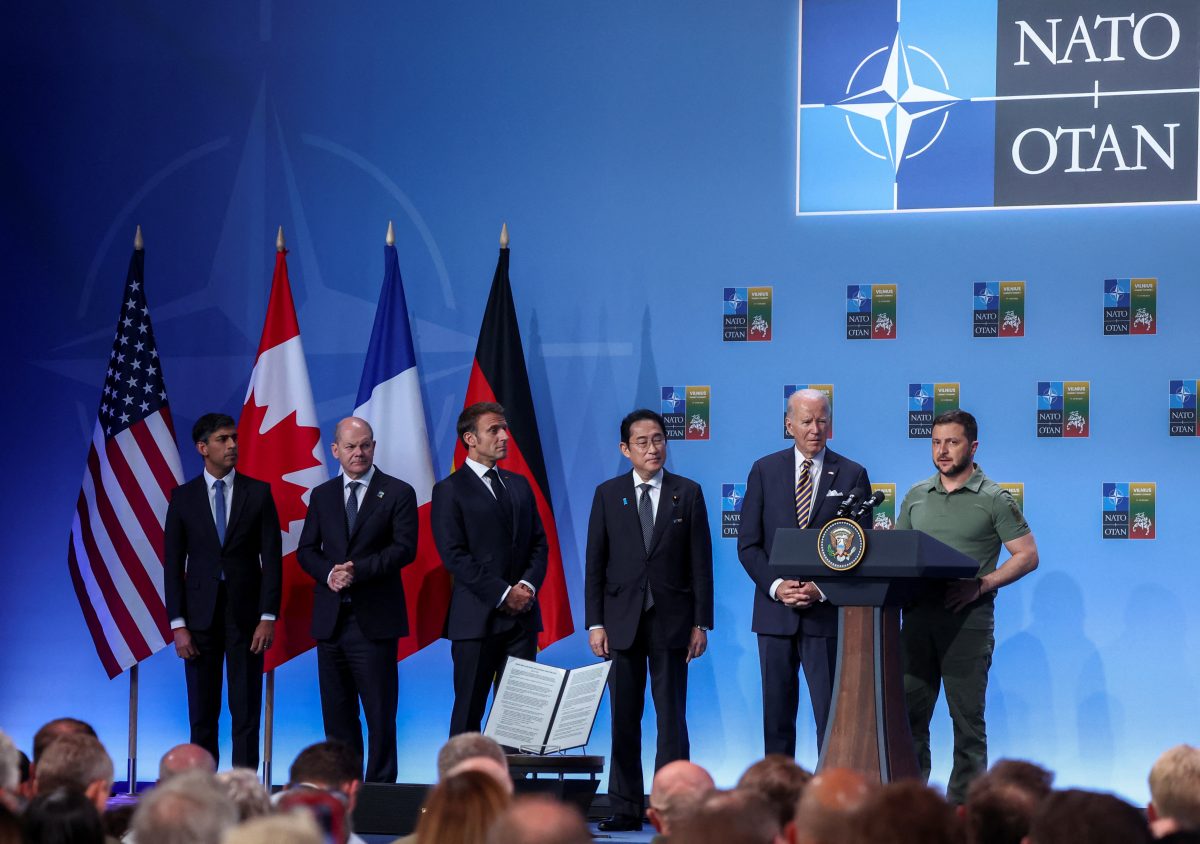VILNIUS, (Reuters) – G7 countries today unveiled an international framework for the long-term security of Ukraine to boost its defences against Russia and deter Moscow from future aggression, officials said.
Ukrainian President Volodymyr Zelenskiy was meeting leaders of NATO at a summit of the 31-member Western alliance, a day after they declared that Ukraine’s future lay inside NATO but rebuffed his call for a timeline for membership.
Unable to join NATO while the war with Russia continues – given that NATO’s Article 5,stipulating that an attack on one member is an attack on all, could push it into war with Russia – Ukraine nevertheless reaped rewards in the form of current and long-term security commitments it has lobbied for.
NATO has pointedly refrained from giving military assistance to Ukraine as an organisation, to avoid entering a direct conflict with Russia, and is keen to continue leaving that to member states and others.
Britain, France, Germany and the United States have been negotiating with Kyiv for weeks over a multilateral text to create a broad international framework, encompassing elements including advanced military equipment, such as fighter jets, as well as training, intelligence-sharing and cyber defence.
The Group of Seven major industrialised countries said in a statement: “Today we are launching negotiations with Ukraine to formalize – through bilateral security commitments and arrangements aligned with this multilateral framework, in accordance with our respective legal and constitutional requirements – our enduring support to Ukraine as it defends its sovereignty and territorial integrity.”
U.S. President Joe Biden said at the signing ceremony for the plan that it was “a powerful statement of our commitment to Ukraine”.
Zelenskiy said: “Today there are security guarantees for Ukraine on the way to NATO…that shall be further extended through arrangements with our key partners.
“(Our) delegation is bringing home significant a security victory for Ukraine,” he added.
Kremlin spokesman Dmitry Peskov called the G7 move misguided and “potentially very dangerous” for the West to give Ukraine security guarantees, which it said would infringe on Russia’s own security.
Moscow has cited NATO’s eastern enlargement towards its borders as a factor in its decision last year to invade Western-leaning Ukraine, which was once part of the old Russian-dominated Soviet Union.
The G7, which comprises the United States, Germany, Japan, France, Canada, Italy and Britain, as well as the European Union, said other countries could also sign on to make their own commitments.
The declaration said the G7 nations would begin bilateral talks with Ukraine immediately.
“The new document should be valid for as long as Ukraine is not in NATO,” Zelenskiy told a separate news conference. “Today’s declaration opens that possibility with strong bilateral agreements,” he went on, adding that the best guarantee was still to be in the alliance itself.
In return, the G7 statement said, Ukraine will promise measures to improve democratic governance, including through judicial and economic reforms and enhanced transparency.
“We will work with Ukraine on an enhanced package of security commitments and arrangements in case of future aggression to enable Ukraine to defend its territory and sovereignty,” the G7 said.
“This multilateral declaration will send a significant signal to Russia that time is not on its side,” a White House official told reporters.
A U.S. official said Washington would begin its own negotiations with Kyiv soon. President Joe Biden has spoken about using U.S. support for Israel as a possible model.
U.S. military aid for Israel is worth about $3.5 billion a year, but the relationship also entails a great deal of political support.
Germany has already said that it would initially provide 12 billion euros in military support for Ukraine through 2032, including 3.2 billion euros for 2023.
France, which said on Tuesday it would supply long-range cruise missiles to Kyiv for the first time, is also negotiating with Ukraine, but will possibly face tough discussions in parliament as it debates its military budget from 2025 to 2030.
Speaking to reporters, British Defence Secretary Ben Wallace said his country and others envisaged sending personnel to Ukraine after the war to keep training its armed forces.







